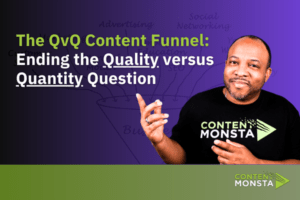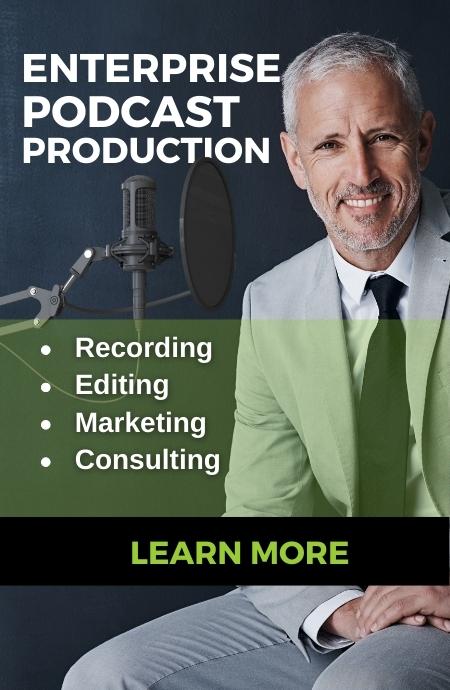This article originally appeared in Forbes.
Business podcasts are often referred to as “branded podcasts” because there is a company brand behind the show. These companies have the goal of driving business and remaining top of mind to customers and prospects.
However, measuring the success of a business podcast is much different than a personal interest or entertainment podcast. While entertainment and personal interests can be a part of the subject matter, business podcasts are more for content marketing than entertainment. Business podcasts are created with specific intents and purposes.
Because the end goal is to drive business, standard podcast measurements such as subscriptions, downloads and chart positions are less important for branded podcasts. These statistics can be used to indicate the growth or direction of the podcast, but in the end, the return-on-investment goals are the same as any other content marketing material. It’s a long-term measurement that is finally quantified by its influence on the business. That should be your branded podcast’s intent: to create a positive influence on your business. The podcast supports your overall marketing purpose, which is to grow your business.
Now that we’ve defined the intent and purpose for creating a branded podcast, it’s important to define your goals and what actions will drive them. Being that podcasting is one of the most effective forms of content marketing, here are some key performance indicators that apply best to podcasts:
• Brand Awareness: Is your podcast generating more mentions on social media or within your industry?
• Engagement: Are you receiving feedback from your audience either directly or from content generated from your podcast?
• Customer Loyalty: Have your customers indicated that they have learned from your podcast? This is a signal of their investment in your brand.
• Authority: Are you gaining a share of voice in your industry? Where do you show up against your competitors when you search for podcasts in your industry?
• Earned Media: Are you finding mentions of your podcast? And are you getting invited onto other podcasts because of your podcast?
Podcasts support these content marketing measurements well. While not as concrete as the numbers provided by statistics such as downloads and subscriptions, the most important features of podcasting are indirect business values.
Keep these five valuable characteristics of podcasting in mind when measuring the success of your show:
Conveys Authority
Podcasts give you the opportunity to share your expertise in a conversational way. You can relate to your customers’ needs while sharing the experiences of others like them.
When you bring other authorities from your industry onto your podcast, you are getting an industry cosign. Not only can you share your guests’ knowledge, but you can also strengthen your listeners’ perception of your authority through association with other experts.
Creates Scalable Content
Podcasting is an excellent source of base content — big content pieces that can be broken down into additional content pieces. This allows you to scale any given podcast episode across your marketing strategy. For example, from one episode, you could generate long-form blog content from the transcript, short social posts of highlights, audiograms, video snippets and more. With all this content, you can show up more on social media and in the path of prospective customers.
Expands Your Audience
Having a platform with access to a topic-focused audience can attract other authoritative figures to your brand and audience. Allowing these figures to gain access to your audience opens the door to opportunities for you to access theirs. Typically, these guests will share your show as appreciation for including them. Plus, you have created content for that guest, which gives them the incentive to share your content that includes them.
Keeps Your Brand Top of Mind
Having a podcast gives you a regular place in the ears of your prospects. Using the podcast and all the content derived from it allows you to increase the frequency that your brand lands in your prospect’s ears and eyes. You could even bring your most engaged existing customer onto your podcast. This can build loyalty and admiration for your brand.
Helps Your Brand Engage More Consistently With Consumers
Finally, the most important part of podcasting, in my opinion, is the expectation of regularly scheduled new content. Podcasts are unique because consumers can subscribe to have content delivered to their mobile devices that they can consume passively while engaging in other activities. This regular delivery allows consumers to align your regular content with their regular activities such as driving, working out or housework.
Being more consistent than your competition can also translate into your brand’s dependability and consistency of service.
Conclusion
Measuring a branded business podcast should be done very differently than casual or entertainment-focused podcasts. Business podcasts have a specific intent and focus. The key performance indicators of a business podcast often come in softer measurements that are realized over a longer period of time, similar to most content marketing. When you realize the true values and benefits of podcasting, the measurement of its success can be realized through the long-term value brought to your business.

The QvQ Content Funnel: Ending the Quality versus Quantity Question
Marketers often debate whether to prioritize the quality or quantity of content. The QvQ Content Funnel proposes a strategy to balance both, tailoring content type and volume to different sales funnel stages. This method enhances engagement, drives conversions, and builds customer loyalty by delivering the right content at the right time.

5 Digital Marketing Content Types That Drive Business
There are several digital marketing content types that are sure to drive business over the coming years. It’s no secret that content marketing is the driving force behind most, if

Marketing Video Budget – How to secure executive approval
Discover how to secure executive approval for your video marketing budget. This article teaches you to address the critical concerns of CFOs and CMOs, focusing on efficiency, cost-effectiveness, and ROI. Learn strategies for promoting quick turnarounds, diversifying video content, and implementing remote production. Equip yourself with the tools to present a strategic, results-oriented plan that aligns with your company’s goals and impresses your executives.





